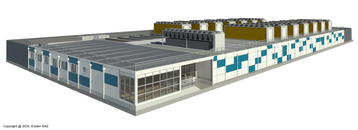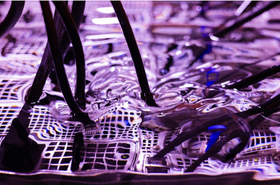The first module of the Jupiter supercomputer has launched and been ranked first in the latest Green500 list.
The module, dubbed Jupiter's Exascale Development Instrument (JEDI), is the first module of the upcoming exascale Jupiter high performance computing (HPC) system that will be housed in the Forschungszentrum Jülich facilities in Germany.
The HPC system is a project under the European High Performance Computing Joint Undertaking (EuroHPC JU) and is being developed by Atos' Eviden and German modular supercomputing company ParTec.
According to ParTec, JEDI was installed in April 2024 and uses the same hardware as the booster module which is currently being built at Forschungszentrum Jülich. That module alone is capable of 72 billion floating-point operations per second per watt.
Much of JEDI's efficiency is driven by its reliance on GPUs, ParTec said. "Virtually all leading systems on the Green500 ranking rely heavily on GPUs, which are designed to perform calculations with greater energy efficiency than conventional central processing units (CPUs)," the company explained.
JEDI uses the Nvidia GH200 Grace Hopper Superchip and is based on Eviden's latest BullSequana XH3000 architecture. It uses direct liquid cooling which requires less energy than air cooling and enables the heat to be reused elsewhere.
The machine consists of a single rack containing 24 compute nodes. These are connected via four Nvidia Quantum-2 Infiniband switches. An additional 24 nodes will be added this month.
During measurements for the Green500 ranking of the most energy-efficient supercomputers, the JEDI system achieved a computing power of 4.5 quadrillion floating-point operations per second, or 4.5 petaflops, with an average power consumption of 66 kilowatts. During optimized operation, the power consumption was reduced to 52 kilowatts.
Scientists are able to access JEDI as part of the JUPITER Research and Early Access Program in order to optimize their codes.
Germany was awarded Europe's first Exascale supercomputer in June 2022 by the EuroHPC JU. The final stages of Jupiter are set to be installed in the second half of this year, and will be made generally available in early 2025. Once complete, for 80-bit calculations the computing power is set to increase to well over 70 exaflops, with an energy requirement averaging 11MW.
"By using the dynamic Modular System Architecture (dMSA), the central European technology to build modular supercomputer and quantum computer, as well as ParaStation Modulo, the MSA-enabling software suite both developed by ParTec, JUPITER will achieve an outstanding level of computing power while decreasing the energy consumption. On top it will be by far the fastest AI-super computer at FP 16” says Bernhard Frohwitter, CEO of ParTec AG.
Second place on the Green500 was taken by the UK-based Isambard-AI phase 1, which officially came online on May 13. Third place was filled by the Helios GPU supercomputer in Poland.







